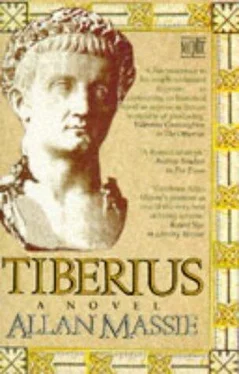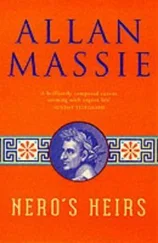Allan Massie - Tiberius
Здесь есть возможность читать онлайн «Allan Massie - Tiberius» весь текст электронной книги совершенно бесплатно (целиком полную версию без сокращений). В некоторых случаях можно слушать аудио, скачать через торрент в формате fb2 и присутствует краткое содержание. Жанр: Исторические приключения, на английском языке. Описание произведения, (предисловие) а так же отзывы посетителей доступны на портале библиотеки ЛибКат.
- Название:Tiberius
- Автор:
- Жанр:
- Год:неизвестен
- ISBN:нет данных
- Рейтинг книги:5 / 5. Голосов: 1
-
Избранное:Добавить в избранное
- Отзывы:
-
Ваша оценка:
- 100
- 1
- 2
- 3
- 4
- 5
Tiberius: краткое содержание, описание и аннотация
Предлагаем к чтению аннотацию, описание, краткое содержание или предисловие (зависит от того, что написал сам автор книги «Tiberius»). Если вы не нашли необходимую информацию о книге — напишите в комментариях, мы постараемся отыскать её.
Tiberius — читать онлайн бесплатно полную книгу (весь текст) целиком
Ниже представлен текст книги, разбитый по страницам. Система сохранения места последней прочитанной страницы, позволяет с удобством читать онлайн бесплатно книгу «Tiberius», без необходимости каждый раз заново искать на чём Вы остановились. Поставьте закладку, и сможете в любой момент перейти на страницу, на которой закончили чтение.
Интервал:
Закладка:
"Don't water it," he said, "it delays the effect…"
As the sun set he would embark on long monologues, to which I scarcely listened and which I could not anyhow have understood.
He was an unlucky man, of poor judgment and some sense of honour. Fortune having dishonoured him, he sought refuge from the regrets which assailed him in eating and drinking. As the years have slipped away, I have come to understand him; and to sympathise.
"Why prolong life save to prolong pleasure?" he would sigh, raising a cup of wine; and a tear would trickle down his fat cheek.
A few years ago my father started to appear in my dreams. I would see him standing on a promontory looking out to sea. He was watching for a sail. I gazed at the blue water too, but did not dare to approach him. Then the sun was darkened, as if in an eclipse, and when light returned my father had vanished; in his place stood a white cockerel bleeding from the neck. This dream came to me, in identical form, perhaps seven times. At last I consulted Thrasyllus but even he, the most acute interpreter of dreams, was unable to supply an explanation.
Or perhaps dared not. In my position few, even among trusted friends, have the courage to speak their minds.
Drusus, as I say, was never allowed to visit our father. Indeed I do not think he ever thought of him, except when I compelled the subject. But then he had no memories, and Drusus was never introspective. I, on the other hand, can recall my father on his knees clutching my mother's ankles and sobbing out his love for her. She disengaged her legs: he fell prostrate on marble; and I began to howl. I was three at the time.
I adored my mother for her beauty, and for being herself. She would sing me to sleep with honied voice; the touch of her fingers on my eyelids fell like rose petals. She would tell me stories of my ancestors and of the gods, of Troy and of Orpheus, and the wanderings of my forefather Aeneas. At the age of five I wept for Dido, Queen of Carthage, and she said:
"You are wrong to weep. Aeneas was fulfilling his destiny." "Is destiny so grim, Mama?" "Go to sleep, child."
Drusus would clamber all over our stepfather who would kiss him and throw him in the air and laugh at his whoops. But I kept my distance. My love was for Mama, whose favourite I knew myself to be. That was important to me, and it confirmed me in what may have been an instinctive conviction that the world is ignorant of justice: for I knew Drusus to have a charm that I lacked, and, moreover, I recognised in him a sunny virtue which was absent from my character. His temper was benign. Nothing alarmed him. He was always truthful and generous. Even as a baby he would surrender a cherished toy with a happy smile. But I was greedy, and untruthful, and afraid of the dark places and of night. (Yet I also welcomed the night, and never went reluctant to bed, because I knew that bedtime promised me my mother's undivided attention, promised me stories, and the cool touch of her sweet-smelling hand; I would lie waiting for sleep in a world from which all but the two of us were banished…)
Because I was her favourite she chastised me. She whipped me for my transgressions till I was within a few years of assuming the toga virilis. I recognised in her lashes, which bit with stinging joy into my flesh, the strange expression of her love: each blow sang out that I should be her creature, hers alone. We were joined together in a savage rite: Claudian pride flayed Claudian pride, and called for a cry of mercy, which never came. And then, afterwards, how sweet and honied the reconciliation!
We were joined in passion, all the more intense because we are both shy of speech. In public she sometimes liked to mock me; as I grew older she would upbraid me for a great clumsy oaf. We never referred to such outbursts when we were alone. I knew them to be provoked by the intensity of her love, which she resented. It annoyed her, no, infuriated her, to know how much she cared.
When I was a child she mocked and whipped me out of my stammer. "It makes you seem a dolt," she said. "Do you want the world to take you for a fool?" So, by willpower, I overcame my infirmity.
Her moods were as quick-changing as mountain weather. Her inconsistency was wild enchantment. When she smiled the world was spring sunshine; but her frowns darkened any company. Consequently we were engaged in endless warfare. I found her entrancing, but I declined to submit to her black moods. Yet it was in my reaction to Livia that I came to sense my superiority to my stepfather: he was afraid of her; I was not.
Of course he loved her, depended on her, could not — as he often exclaimed — imagine life without her. Very good, I don't dispute it. Yet he was always less in her presence, more timid, more circumspect, dreading that she should turn cold and refuse to speak to him. That was all Livia has ever had to do to bring Augustus to heel: refuse to speak to him. I, on the other hand, know myself her equal; and, in fact, since I grew up, Livia has been a little in awe of me.
I have run ahead of myself, ahead of my story. Yet it is hard to see how autobiography can avoid being discursive. Everything one recalls promotes reflection. I am writing of people without whom my life is unimaginable.
Perhaps it will be easier to keep to the point when I get beyond childhood. For, looking back on childhood, I see one thing clearly: there is no narrative there. Childhood is a state, not a story. Let me try to reveal my childhood in four distinct episodes therefore.
I was, as I said, nine when my father died. Naturally I did not weep.
"You are head of the family now," Livia said. "What do I h ave to do, mama?"
"First, it will be your duty to pronounce your father's funeral oration…"
I don't know who wrote it, but I daresay its author made the best he could of it. These people have a certain professional pride after all. But there was not much to say about the poor man, and it was raining, a November day of thick cloud that obscured the houses on the Palatine Hill. I rehearsed the speech so well that I can remember parts of it to this day.
My father was a victim. I see that now, though in my adolescence I came to think harshly of him as a weakling and failure. His public history was undistinguished. He fought with Julius Caesar in the war against Pompey and commanded the dictator's fleet at Alexandria. But this association disgusted him, for he saw that Julius was an enemy of the traditional liberties of the Roman people. Too tender-hearted to join the conspiracy of the Ides of March and perhaps inhibited by his consciousness of what he had himself received from the dictator, he nevertheless rejoiced at its success. In the Senate he proposed that the Liberators be publicly rewarded. That suggestion was enough for him to earn my stepfather's undying hatred; not, you understand, that Augustus (as it is convenient to call him, though he had not yet been accorded that honorific title) had any affection for Julius himself; but because he knew it was expedient that he should pay public honour to his name. Otherwise, why should Caesar's old soldiers fight for him?
Reluctant to leave Italy, where he feared the confiscation of his estates, convinced anyway that the Liberators could never withstand the Caesarean forces, my father naturally adhered to Antony rather than to Augustus. Besides, he was an old friend — and personal loyalty meant much to him — of the younger Antony, Lucius, who had inveigled him into the campaign that was to end in the terrible siege of Perugia. He never forgot the rigours of that siege, and even the mention of Mark Antony's wife, the loathsome Fulvia, would make him shudder, right up to his death. Desperate now, he blundered again, joining himself with Sextus Pompeius, the unprincipled son of a dubiously great father. He was soon disillusioned, and rejoined Antony. Then came the Peace of Misenum. During the negotiations that led up to it, Augustus encountered Livia, fell in love with her, and carried her off.
Читать дальшеИнтервал:
Закладка:
Похожие книги на «Tiberius»
Представляем Вашему вниманию похожие книги на «Tiberius» списком для выбора. Мы отобрали схожую по названию и смыслу литературу в надежде предоставить читателям больше вариантов отыскать новые, интересные, ещё непрочитанные произведения.
Обсуждение, отзывы о книге «Tiberius» и просто собственные мнения читателей. Оставьте ваши комментарии, напишите, что Вы думаете о произведении, его смысле или главных героях. Укажите что конкретно понравилось, а что нет, и почему Вы так считаете.












